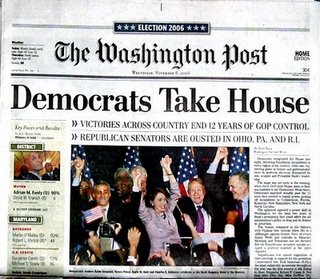 One Syllable of Civility
One Syllable of CivilityBy
Ruth MarcusWednesday, November 22, 2006; Page A21
If he wanted to, President Bush could change the tone in Washington with a single syllable: He could just say "ic." That is, he could stop referring to the opposition as the "Democrat Party" and call the other side, as it prefers, the Democratic Party.
The derisive use of "Democrat" in this way was a Bush staple during the recent campaign. "There are people in the Democrat Party who think they can spend your money far better than you can," he would say in his stump speech, or, "Raising taxes is a Democrat idea of growing the economy," or, "However they put it, the Democrat approach in Iraq comes down to this: The terrorists win and America loses."
But even as he promised to work to change the tone in Washington after the elections, the president couldn't manage to change his language. In his day-after-the-elections news
conference, Bush employed this needling locution five times. "This morning, I spoke with Republican and Democrat leadership in the House and Senate," he began, adding, "it is clear the Democrat Party had a good night last night." That was followed by references to "Democrat leaders," "Democrat leadership" and "Democrat votes," as in, "We got some tax cuts passed with Democrat votes." Geez, you'd think he'd at least give them the -ic when they vote for his tax cuts.
The president isn't alone in his adjectival aversion to "Democratic" when it comes to the party. The provenance of the sneering label "Democrat Party" stretches back to the Harding administration. William Safire traced an early usage to Harold Stassen, who was managing Wendell Willkie's 1940 campaign against Franklin D. Roosevelt. A party run by political bosses, Stassen told Safire for a 1984 column, "should not be called a 'Democratic Party.' It should be called the 'Democrat party.' "
Democrat Party was used, pardon the phrase, liberally by Wisconsin Sen. Joseph McCarthy. According to the Columbia Guide to Standard American English, " Democrat as an adjective is still sometimes used by some twentieth-century Republicans as a campaign tool but was used with particular virulence" by McCarthy, "who sought by repeatedly calling it the Democrat party to deny it any possible benefit of the suggestion that it might also be democratic." The word also achieved a prominent run with Bob Dole's especially ugly reference to "Democrat wars" during the 1976 vice presidential debate.
But Democrat-as-epithet has seen its fullest flowering -- on talk radio, among congressional leaders and, more than with any of his predecessors, from the president himself -- during the recent Republican heyday. As Hendrik Hertzberg pointed out in the New Yorker in August, the conservative Web site NewsMax.com takes pains to scrub Associated Press copy "to de-'ic' references" to the party.
There is, I concede, a trivial, sticks-and-stones quality to this linguistic bickering. "Two thousand, eight hundred, forty-seven votes in Montana may break your control," the Democrats might taunt the GOP, "but names will never hurt us." As any parent who's ever had to mediate between squabbling siblings could tell them, "He's only doing it because he knows it bothers you. If you don't respond to him, he'll stop." After all, Democrats, what's so terrible about being called Democrat, small "d" or large?
But as a matter of simple politeness -- something the Bush family is famously good at -- it's rude to call people by a term that makes them bristle, even a seemingly innocuous one. There's also something grating and coarse-sounding about this abbreviated appellation, like saying "Jew" instead of "Jewish." It is, conservative wordsmith William F. Buckley wrote in National Review in 2002, "offensive to the ear."
And with reason: It's intended to be. Republican -- Publican? -- politicians drop the -ic both to annoy the opposition and to diminish the big-D Democrats' claim to the small-d democratic virtues. " 'Democrat Party' is a slur, or intended to be -- a handy way to express contempt," Hertzberg wrote. "At a slightly higher level of sophistication, it's an attempt to deny the enemy the positive connotations of its chosen appellation."
In the few weeks since the election, the president has followed up his syrupy rhetoric of cooperation with a series of face slaps: pushing the doomed nomination of John Bolton to be ambassador to the United Nations, resubmitting the equally doomed nominations of a quartet of offensive judicial selections and naming a physician to head the federal family planning program who works for clinics that refuse to offer birth control.
So it's probably naive to give any credence to the presidential happy talk and blue ties. But if, just maybe, the president wants to do more than pay lip service to the notion of a new tone in Washington, he could start by just paying lip service.
marcusr@washpost.com----------------------
(Until "they" call us the Democratic Party ,,,RePigliKKKans can Go to HELL !)
====================================================================



























